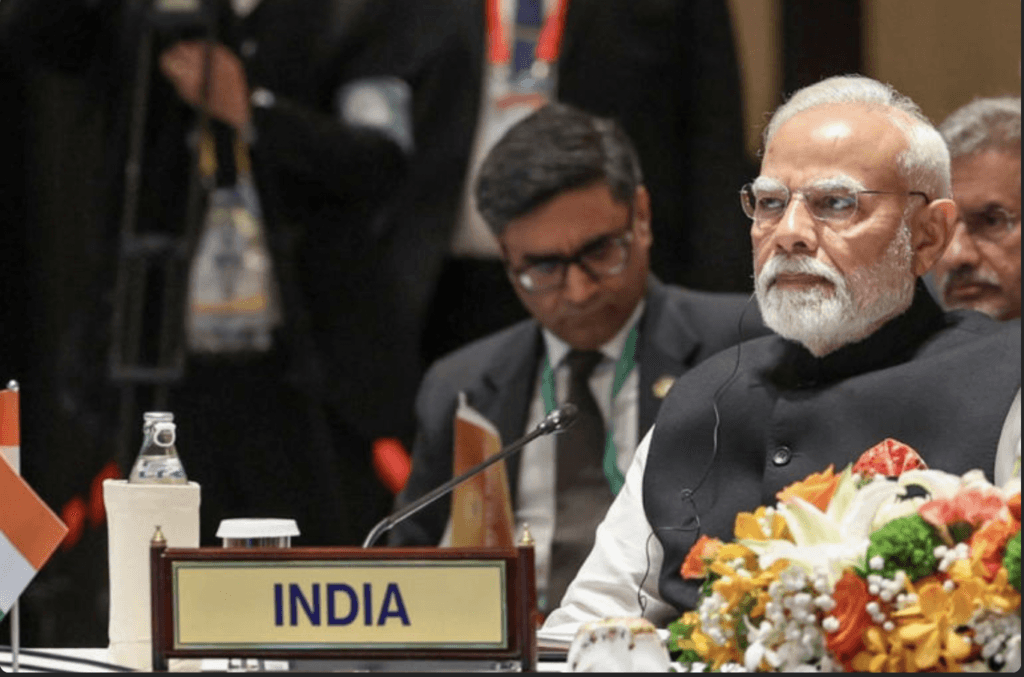Why Prime Minister Narendra Modi’s Sri Lanka Trip Is Crucial for India
Prime Minister Narendra Modi’s upcoming visit to Sri Lanka marks a strategic milestone in India’s foreign policy, reflecting the nation’s commitment to strengthening ties with its maritime neighbor. Amid shifting geopolitical dynamics in the Indian Ocean Region (IOR), this trip underscores India’s role as a reliable partner for Sri Lanka’s stability and growth. Here’s an in-depth look at why this visit holds immense significance.

1. Reinforcing the “Neighborhood First” Policy
Modi’s Sri Lanka visit aligns with India’s “Neighborhood First” doctrine, prioritizing regional cooperation and trust-building. Sri Lanka, strategically located along vital sea routes, is critical to India’s maritime security and economic interests. By addressing Colombo’s concerns—from debt relief to infrastructure development—India aims to counterbalance China’s expanding influence, exemplified by projects like the Hambantota Port. Strengthening ties now could solidify Sri Lanka’s tilt toward New Delhi.
2. Economic Collaboration and Debt Crisis Support
Sri Lanka’s recent economic collapse, marked by hyperinflation and a foreign exchange crisis, necessitated India’s unprecedented $4 billion assistance in 2022. Modi’s visit is expected to focus on:
- New credit lines for infrastructure and renewable energy projects.
- Expanding the Trincomalee Oil Tank Farm partnership, enhancing energy security.
- Boosting trade through the India-Sri Lanka Free Trade Agreement (ISFTA) revival.
These steps aim to position India as Colombo’s primary economic ally, contrasting with China’s debt-trap diplomacy.
3. Cultural Diplomacy and Buddhist Ties
Sri Lanka’s Buddhist-majority population (70%) offers India a unique soft power avenue. Modi’s itinerary is likely to include visits to sacred Buddhist sites like Anuradhapura or Kandy, echoing his 2015 speech to Sri Lanka’s Parliament that highlighted shared civilizational heritage. This outreach not only deepens cultural bonds but also counters China’s attempts to leverage Buddhism in its Belt and Road Initiative (BRI) projects.
4. Security Partnerships in the Indian Ocean
Maritime security remains a cornerstone of India-Sri Lanka relations. Collaborations could include:
- Joint patrols to combat illegal fishing, smuggling, and piracy.
- Surveillance technology sharing to monitor China’s naval activities.
- Counter-terrorism intelligence cooperation, crucial after the 2019 Easter attacks.
Such initiatives reinforce Sri Lanka’s role in India’s SAGAR (Security and Growth for All in the Region) vision.
5. Addressing Tamil Minority Concerns
Sri Lanka’s Tamil community, with historical-cultural links to India, has long sought greater autonomy and justice for civil war-era grievances. Modi is expected to reiterate India’s support for the full implementation of the 13th Amendment (devolution of powers to Tamil provinces). Balancing diplomatic pragmatism with domestic political expectations in Tamil Nadu, this move could strengthen cross-party backing for Modi’s foreign policy.
6. Countering China’s Strategic Footprint
China’s investments in Sri Lanka—including the Hambantota Port, Colombo Port City, and infrastructure projects—have raised alarms in New Delhi. Modi’s visit aims to:
- Offer transparent, sustainable alternatives to BRI projects.
- Fast-track Indian initiatives like the Jaffna Cultural Centre and hybrid renewable energy projects.
- Reaffirm Sri Lanka’s inclusion in India’s “SAGAR” and “Act East” policies.
7. Strengthening Regional Multilateralism
The visit may also lay groundwork for Sri Lanka’s deeper integration with India-led platforms like the BIMSTEC (Bay of Bengal Initiative for Multi-Sectoral Technical and Economic Cooperation) and the Colombo Security Conclave. Enhanced collaboration on climate resilience, digital governance, and disaster management could follow.
Challenges and Expectations
While the visit holds promise, challenges persist:
- Sri Lanka’s political volatility under President Ranil Wickremesinghe.
- Balancing Tamil demands without overstepping sovereignty.
- Ensuring timely execution of pledged projects to build trust.
Conclusion: A Defining Moment for Indo-Lanka Ties
PM Modi’s Sri Lanka trip is more than a diplomatic formality—it’s a strategic opportunity to recalibrate India’s role in South Asia. By addressing economic, cultural, and security priorities, India can foster a stable, prosperous Sri Lanka while safeguarding its own interests in the Indo-Pacific. As global powers vie for influence, Modi’s ability to deliver actionable outcomes will determine India’s leadership in the neighborhood.#WATCH
Pingback: "Kalki 2898 AD Part 2: Nag Ashwin Reveals Shoot Plans, Plot & Prabhas’ Sci-Fi Role"